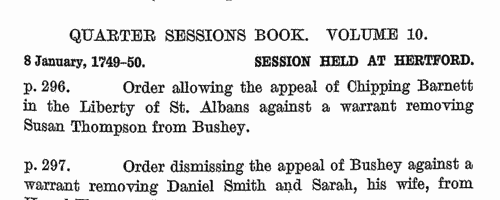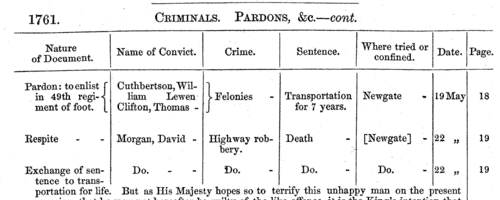Add this eBook to your basket to receive access to all 173 records. Our indexes include entries for the spelling tench. In the period you have requested, we have the following 173 records (displaying 61 to 70): These sample scans are from the original record. You will get scans of the full pages or articles where the surname you searched for has been found. Your web browser may prevent the sample windows from opening; in this case please change your browser settings to allow pop-up windows from this site. Hertfordshire Sessions
(1700-1752)
Incidents from the Hertfordshire Sessions Books and Minute Books. These cover a wide range of criminal and civil business for the county: numerically, the the most cases (240) concerned assaults; presentments about repairs to roads and bridges (67); larceny (63); unlicensed and disorderly alehouses (33); nuisances (28); and trading without due apprenticeship (24). This calendar gives abstracts of all entries in the Sessions Books and Minute Books for Hertfordshire sessions for the period. | Sample scan, click to enlarge

|  Masters of Apprentices registered at Norwich in Norfolk
(1750-1754) Masters of Apprentices registered at Norwich in Norfolk
(1750-1754)
Apprenticeship indentures and clerks' articles were subject to a 6d or 12d per pound stamp duty: the registers of the payments usually give the master's trade, address, and occupation, and the apprentice's father's name and address, as well as details of the date and length of the apprenticeship. There are central registers for collections of the stamp duty in London, as well as returns from collectors in the provinces. These collectors generally received duty just from their own county, but sometimes from further afield. (The sample entry shown on this scan is taken from a Norfolk return) | Sample scan, click to enlarge

|  Apprentices
(1759) Apprentices
(1759)
Apprenticeship indentures and clerks' articles were subject to a 6d or 12d per pound stamp duty: the registers of the payments usually give the master's trade, address, and occupation, and the apprentice's name, as well as details of the date and length of the apprenticeship. 1 January to 12 April 1759. | Sample scan, click to enlarge

| Convicted Criminals
(1762)
When Joseph Redington, Assistant Keeper of the Public Records, calendared the Home Office papers from the accession of king George III, 25 October 1760, to the end of 1765, he gathered together references to criminals from the State Papers Domestic, Warrant Books, and Criminal Papers, and these were printed in tabular form. The information is set out in four sections: -
1. Letters to Judges: giving name of the judge; name of the convict; crime; sentence; where tried or confined; date; page.
2. Petitions in Favour: stating from whom; name of convict; crime; sentence; where tried or confined; object of petition (such as pardon or commutation); date.
3. Reports or Certificates of the Judges, chiefly addressed to the king, on the Cases of Criminals: with name of judge; name of criminal; crime; sentence; where tried or confined; condition of pardon.
4. Warrants and Letters relating to Criminals convicted, being Pardons, Respites &c.: with nature of document; name of convict; crime; sentence; where tried or confined; date; page.
The names of the criminals were not included in the printed index to the calendars, but we have now indexed them year by year. | Sample scan, click to enlarge

| Spirited and Independent Freeholders of Middlesex
(1769)
This 'LIST of the spirited and independent FREEHOLDERS of MIDDLESEX; Enemies to ministerial Influence, and Court Despotism', giving names and addresses, was published in volume 4 of The Political Register and Impartial Review of New Books, for 1769. | Sample scan, click to enlarge

|  Apprentices
(1770) Apprentices
(1770)
Apprenticeship indentures and clerks' articles were subject to a 6d or 12d per pound stamp duty (late payment of the 6d rate attracted double duty (D D) of 12d): the registers of the payments usually give the master's trade, address, and occupation, and the apprentice's name, as well as details of the date and length of the apprenticeship. 2 January to 31 December 1770. | Sample scan, click to enlarge

|  Apprentices registered in Evesham
(1770) Apprentices registered in Evesham
(1770)
Apprenticeship indentures and clerks' articles were subject to a 6d or 12d per pound stamp duty: the registers of the payments usually give the master's trade, address, and occupation, and the apprentice's name, as well as details of the date and length of the apprenticeship. There are central registers for collections of the stamp duty in London, as well as returns from collectors in the provinces. These collectors generally received duty just from their own county, but sometimes from further afield. The indentures themselves can date from a year or two earlier than this return. (The sample entry shown on this scan is taken from a Durham return. Each entry has two scans, the other being the facing page with the details of the indenture, length of service, and payment of duty.) IR 1/57 | Sample scan, click to enlarge

|  Clerks and apprentices
(1781) Clerks and apprentices
(1781)
Apprenticeship indentures and clerks' articles were subject to a 6d or 12d per pound stamp duty: the registers of the payments usually give the master's trade, address, and occupation, and the apprentice's name, as well as details of the date and length of the apprenticeship. 16 January to 31 December 1781. IR 1/31 | Sample scan, click to enlarge

| Soldiers, administrators, refugees and merchants in America
(1783)
These are the headquarters papers of sir Guy Carleton, British commander-in-chief at the end of the American war of independence. Many of the individuals recorded were part of the British military administration, but others are refugees and merchants whose lives had been disrupted by the conflict. These records cover April to December 1783. | Sample scan, click to enlarge

| Lawyers, Law Officers and Clerks in London
(1791)
The London Law Directory section of the Universal British Directory includes lists of officers, officials and clerks from the High Court of Chancery, Hanaper Office, Examiners Office, Commissioners of Bankrupts, Corporation of Cursitors Office, Commissioners of Lunatics, the courts of King's Bench, Common Pleas, and Exchequer, the Exchequer Office of Pleas, &c. &c., the Duchy of Lancaster Office, the Lord Mayor's Court Office, and the Court of Marshalsea, as well as public notaries, officers of the judges' circuits, proprietors of provincial newspapers, sworn brokers of the City of London, and Jew brokers. | Sample scan, click to enlarge

|
Research your ancestry, family history, genealogy and one-name study by direct access to original records and archives indexed by surname.
|












